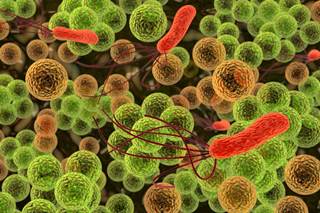August 24, 2016 /

Click here to receive MS news via e-mail
A growing body of research is unraveling a multitude of ways in which the human gut microbiome has a major impact on health. Microbial dysbiosis has been linked with a variety of diseases, including diabetes, rheumatoid arthritis, cardiovascular disease, colorectal cancer, and more, underscoring the diffuse role of intestinal bacteria in biological functioning.1

“Humans have evolved with these gut bacteria over millions of years and have a symbiotic relationship with them,” according to Ashutosh Mangalam, PhD, an assistant professor of pathology at the University of Iowa. “The human host provides them with food and space, and the bacteria help to digest food and extract energy from foods that we cannot digest,” he told Neurology Advisor. Clues to the role of the gut microbiota in the development of a healthy immune system have been revealed in various research initiatives, especially in a rodent study in which mice were raised in a germ-free facility.2,3 Their immune systems were initially impaired but were restored via colonization of gut microbes from normal mice.
Read more
MS Views and News
Providing educational information, resources and services for those affected by MS
Visit our MS Learning Channel on YouTube: http://www.youtube.com/msviewsandnews
Stay informed with MS news and information - Sign-up here
For MS patients, caregivers or clinicians, Care to chat about MS? Join Our online COMMUNITY CHAT



